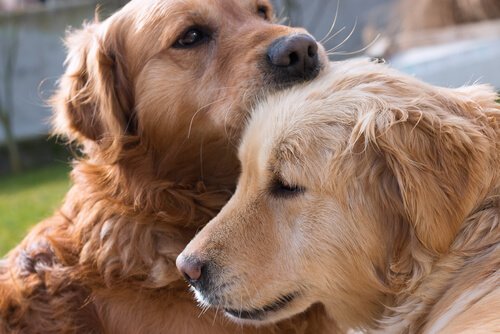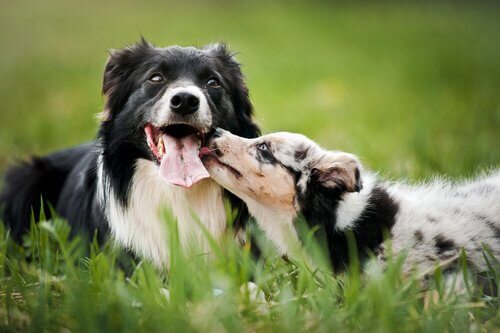Do Love Hormones Influence Animal Behavior?

Sometimes dogs act as though they’re in love with other dogs, and even with other people. And although you might see it, you probably tell yourself that it’s impossible for a dog to fall in love or feel love in the way that we understand it. But, is it true that love hormones influence animal behavior?
There are people who say that they do. But as in all things, there are also skeptics who say that animals don’t have these emotions. Just like you, we at My Animals are animal lovers, and we really do believe that they have these feelings. And furthermore, it’s been demonstrated that love hormones influence animal behavior.
Do love hormones influence animal behavior?

The love hormone, known as oxytocin , is a hormone which makes us want to be close to the people who make us feel good. It makes us feel sociable and confident. Have you ever seen this behavior in a dog? Of course you have!
At Emory University in Atlanta, they decided to study this phenomenon. The idea was to determine if oxytocin influences animal behavior in the same way as it influences human behavior. They arrived at the conclusion that it’s true: love hormones influence animal behavior, and especially in the case of dogs.
To carry out this study, they used 16 dogs over one year of age along with their owners. To begin with, for half of the dogs they rubbed oxytocin on their noses. For the other half, they rubbed a serum. Then they took the dogs to another room separated from their owners.
The owners were asked to avoid paying attention to their dog. This was so that they didn’t encourage affectionate behavior, in order for the researchers to establish whether the hormone could trigger such a response.
When the dogs were let out, those with oxytocin on their noses were much more affectionate. They licked their owners, pawed at them to get their attention, climbed on them, etc.
The rest of the dogs, although they recognized their owners, just wagged their tails a little, sat down, investigated the room a little, or played with other dogs.
This research demonstrated something that previously wasn’t well understood. Many claimed that oxytocin only worked in mammals when it came to sexual relations or falling in love. But this study showed that it works beyond just this.
This hormone makes us socialize, seek to be close to those we know, as well as helping us to socialize and feel comfortable.
Animals do have feelings

We don’t like to be dogmatic (if you’ll pardon the pun), but there are many studies which demonstrate this undeniable fact. Animals feel both positive and negative emotions. We can observe the changes in their behavior every day, and they don’t behave the same way when you’re stroking them as when you’re telling them off.
They yelp when they feel pain and they jump around when they’re really happy. They get sad when you leave the house and excited when you return. Surely this is exactly what we would call feelings or emotions, right?
Dogs, just like other mammals, can feel love, sadness, fear, humiliation, and many other emotions besides. We need to take care of them. Although it’s true that hurting their feelings doesn’t have completely the same effect as with people, we can certainly still cause them pain.
You can probably remember a number of stories we’ve shared about animals that never got over the death of their owner. Or maybe they never got over the death of a friend, another animal in the house, for example. If this isn’t having feelings, then we don’t know what is!
There will always be people who don’t believe it. But we’re animal lovers, and we don’t need a study to tell us that animals have emotions and that they return the love we give to them.